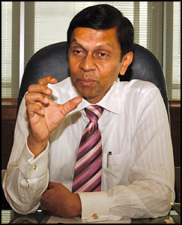|
Central Bank Governor at a seminar on ‘IMF Standby
Agreement’:
‘Sri Lanka coming out of crisis’
by Gamini WARUSHAMANA
The Central Bank Governor Ajith Nivard Cabraal said that the IMF
Standby Agreement facility is not all about money. Quoting executive
director of the IMF Dr. Kishor, he said that it gives a strong positive
message to the world that Sri Lanka is coming out of the crisis.
 |
|
Ajith Nivard Cabraal |
Addressing a seminar on IMF standby agreement facility at the
Institute of Chartered Accountants, Cabraal said that immediately after
the first tranche US$ 206.7 million was received the positive sentiments
have started to work and there is a progress in the stock market and all
other sectors.
Cabraal said, that even without this IMF loan facility thecountry
could face the crisis triggered by the adverse global economic situation
and the IMF loan was received when the economy turning to recovery. He
refrained commenting on the political reasons that delayed the approval
of the loan by the IMF and said the present voting system in the
governing body of the IMF which 20 countries hold 70% of the voting
rights is not fair. “There is an imperfection in the present voting
system and it is being discussed among member countries”, he said.
This IMF loan has become a hot topic and it should be so because this
is the biggest IMF assistance Sri Lanka ever received in the last 50
years. The country has obtained 23 IMF loans in the past and most of the
allegations and criticisms regarding this agreement are baseless and
misleading.
In 2008, Sri Lanka did not want IMF assistance because the economic
fundamentals were strong. Our GDP was growing over 5% average, 8.3% and
7.2% in 2004 and 2005 and 5.2% in 2008.Inflation which was over 20%
started to declined with tight monetary policy we adopted.
Unemployment declined and recorded 5.2%, the lowest. Investment and
fiscal position were at satisfactory. External debt was at healthy 33%
level and we had sufficient reserve position it was at the highest level
by July 2008.
However, after the global financial crisis in the fourth quarter of
2008 the trend reversed and large sums of investment in T-bills and
T-bonds started to withdraw.
Export sector was affected and major currencies were losing their
value. In March our reserve level declined to the lowest but still we
had reserve enough to absorb external shocks.
Cabraal said that the measures taken by the government to rebuild the
reserve position was successful.
Supports from friendly countries and selling T-bonds to Sri lankan
diaspora were successful and reserve level was increasing by the time
the IMF loan was received.
Objectives
Cabraal said that the key objectives of the IMF loan are rebuilding
reserve position, strengthening fiscal position, strengthening the
domestic financial system and maintain financial stability. The amount
received, 1.65 bn SDR (US$2.6bn) is 400% of the country’s quota. The
interest rate is 0.3% per annum plus 1% fixed margin.
Conditions
The IMF conditionalities associated with its loan packages are
controversial topics across the world. Cabraal accepted this and said in
the past IMF loans triggered massive political upheavals, labour unrest
and finally led to fall of governments. Therefore some countries, even
in Sri Lanka, the previous governments held the Letter of Intent (LOI)
secret. However, this time few minutes after the signing the agreement
the Central Bank published the LOI on the web. He assured that there are
no conditionalities on spending of the loan or any hidden agreement as
some sectors charged.
There is no adverse condition we have agreed. But there is a
benchmark. The benchmark too does not contain IMF conditions and they
are in government policies. Receiving the IMF loan is an IMF endorsement
on it.
To achieve the reserve target there is no exchange rate target and CB
and the market will determine the exchange rate. We had a target to
reduce budget deficit to 6.5% in 2009,5.8% in 2010 and 5.0% in 2011. We
have more flexibility in the IMF agreement and our new targets are 7% in
2009, 6% in 2010 and 5% in 2011.
Reform of CEB and CPC are also not IMF conditions and they are in the
government development priorities. There were plans to introduce new
management systems and improve work efficiencies in these institutions
Cabraal said.
Responding to opposition criticism on IMF conditions he said that
worst conditions were agreed upon by the then governments in 2001 and
2003. In 2001 government agreed conditions such as Restructuring the
Peoples Bank, freezing recruitment to state institutions, cutting
defence expenditure, stopping new government constructions, selling off
CWE. In 2003 again the government agreed to another 13 point reform
agenda including selling 90% of the Sri Lanka Insurance Corporation
shares, appointing Revenue authority and extending VAT to whole sale and
retail sector, he said. |

